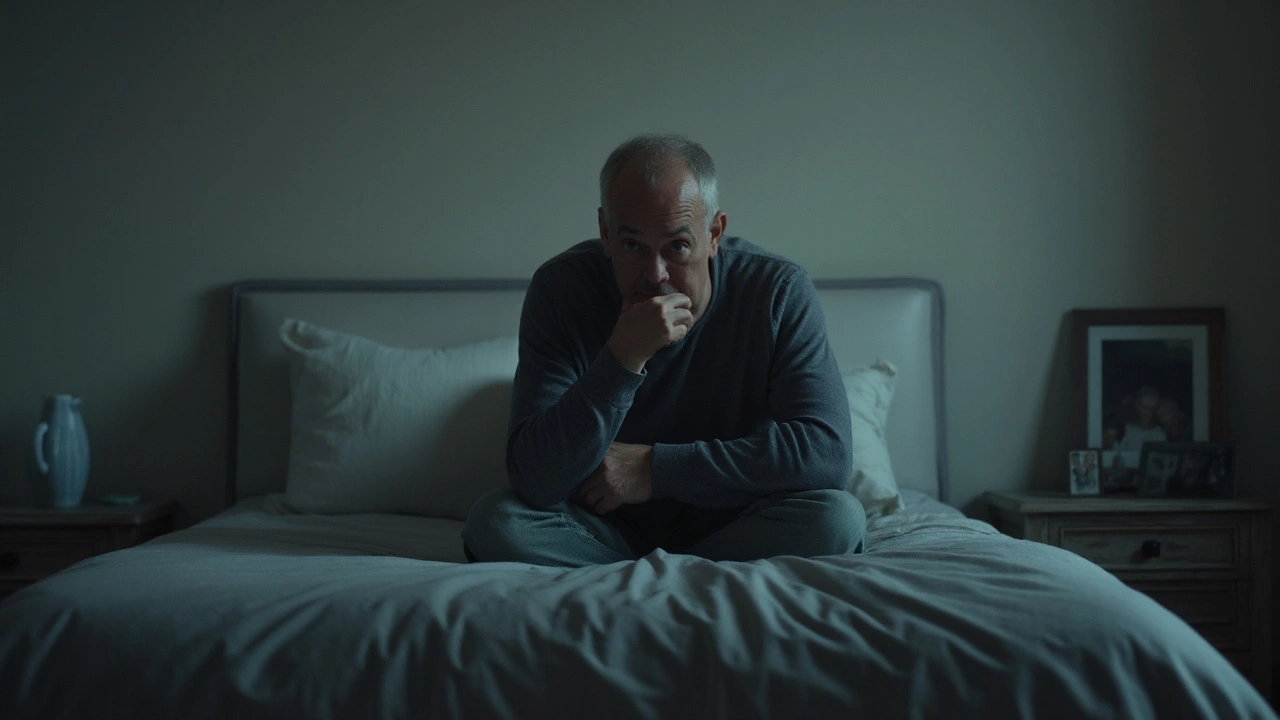Depression does not discriminate. It affects people of all genders, ages, and backgrounds. However, depression in men can often look different than it does in women, making it harder to recognize. Societal expectations around masculinity often discourage men from talking about their emotions, worsening the problem.
Understanding these unique aspects is crucial because depression is a serious condition that can have devastating consequences if left untreated. In this article, we will delve into how depression manifests in men, break down some stereotypes, and provide actionable advice for those affected and their loved ones.
- Understanding Male Depression
- Common Symptoms in Men
- The Impact of Societal Expectations
- Practical Tips for Seeking Help
Understanding Male Depression
Depression can affect anyone, but it often presents differently in men compared to women. This difference is partly due to biological factors like hormones that influence mood and partly due to societal norms around masculinity. Men are commonly expected to be strong, stoic, and self-reliant, which often discourages them from acknowledging or sharing their emotional struggles. This can result in depression symptoms being missed or misunderstood.
While men do experience typical symptoms of depression like sadness and hopelessness, they more frequently exhibit signs that are less obvious. For instance, they may become irritable, aggressive, or engage in risk-taking behaviors. Anger and irritability can often be misinterpreted as personality flaws rather than signs of underlying depression.
Men with depression might also struggle with physical issues such as chronic pain, digestive problems, or headaches. These physical symptoms often mask the real psychological issues, making it hard to diagnose depression. Men might not link their physical symptoms to their emotional state, which can delay their seeking help. They may also turn to substance abuse, utilizing drugs or alcohol to numb their feelings, further complicating their condition.
"Depression in men can be difficult to recognize because men may not be willing to talk about their feelings. They may mask depression with anger or engage in risky behaviors as a form of self-medication," says Dr. Andrew Solomon, a renowned psychologist and author.
Statistics also paint a dire picture. According to the American Psychological Association, men are four times more likely than women to die by suicide, highlighting a critical need for better mental health support tailored to men’s unique experiences. The stigma surrounding men's mental health can often result in delayed treatment, worsening the symptoms over time and leading to fatal outcomes.
It is important to note that cultural differences play a role as well. In many societies, showing vulnerability is perceived as a weakness, particularly for men, making it even harder to seek help. This cultural pressure can exacerbate feelings of isolation and sadness. Initiatives focused on encouraging men to speak openly about their mental health have shown promise but are only a small step towards a broader cultural change.
Understanding these nuances is vital for healthcare providers, loved ones, and communities to offer better support. Recognizing that men may show different signs of depression and approaching the situation with empathy can create a more accepting environment for those suffering to come forward and seek the help they need.

Common Symptoms in Men
When it comes to recognizing depression in men, it's important to note that the symptoms can differ significantly from those typically seen in women. Men often exhibit physical signs, or behaviors, instead of expressing their emotions directly. This deviation can make it challenging to identify depression in men.
One of the most common symptoms in men is increased irritability or anger. Unlike women, who might express sadness more openly, men tend to externalize their distress. This can sometimes translate into aggressive behavior or constant irritability, often misconstrued as a personality flaw rather than a symptom of depression. Frequently, what gets overlooked is that this behavior stems from underlying pain and emotional turmoil.
Another key sign is escapist behavior. Men may indulge in excessive drinking, gambling, or other risky behaviors as a way to escape their feelings. Engaging in such activities can be an attempt to distract themselves from their struggles. However, this only provides temporary relief, exacerbating the problem in the long run. The use of such coping mechanisms often delays the essential step of seeking help.
Men dealing with depression symptoms also tend to withdraw from family and friends. Social isolation can be both a symptom and a result of depression. Men might feel ashamed to share their feelings, fearing they will be judged or perceived as weak. This sense of isolation adds to the emotional burden, worsening their condition.
Fatigue and sleep issues are other notable symptoms. Men might find themselves feeling constantly tired, even after a good night's sleep. On the flip side, some may struggle with insomnia, spending sleepless nights, and feeling drained throughout the day. The irony is that both excessive sleeping and insomnia are tell-tale signs of depression that often go unnoticed.
Depression in men can also manifest through physical aches and pains. Headaches, back pain, and digestive issues can sometimes be linked to depression. Men may visit multiple doctors to address these issues, not realizing that the root cause might be psychological. A comprehensive approach to health often reveals these underlying connections.
Difficulty concentrating or making decisions is another red flag. Men might find it challenging to focus on tasks, impacting their performance at work or daily life. They may struggle with making choices, even simple ones, leading to a sense of frustration and helplessness. This mental fog can have far-reaching effects on various aspects of life.
Lastly, thoughts of suicide or self-harm are among the most alarming symptoms. Men with severe depression might experience suicidal ideation, feeling like there's no way out of their pain. This symptom underscores the urgent need for intervention and support. Mental health resources can be life-saving and should be sought without hesitation.
According to the American Foundation for Suicide Prevention, men die by suicide 3.63 times more often than women. This stark statistic highlights the importance of recognizing symptoms early and taking proactive measures.
Recognizing these symptoms is the first step towards addressing and treating depression in men. By understanding these unique manifestations, we can offer better support and encourage men to seek the help they need.

The Impact of Societal Expectations
Society often labels men as strong, stoic figures who should not show signs of weakness, typically associated with depression in men. This deeply ingrained belief system can contribute significantly to undiagnosed and untreated mental health issues among men. When men are taught from a young age to suppress their emotions, they often internalize feelings of sadness, anxiety, or hopelessness, leading to severe consequences.
Research shows that men are far less likely to seek help for emotional problems compared to women. The phrase "man up" is often heard during boys' upbringing, reinforcing the idea that expressing vulnerability is not manly. This societal expectation propels men into unhealthy coping mechanisms like excessive drinking, drug use, or even aggression.
Statistics paint a worrying picture. The American Psychological Association notes that men have higher rates of suicide than women, which may partly stem from their reluctance to ask for help. Men also often present depression symptoms differently, such as irritability and anger, rather than sadness. These variations can make it even harder to recognize and diagnose depression symptoms.
"Many men believe that admitting emotional distress somehow diminishes their masculinity. This belief is a significant barrier to accessing mental health support." — Dr. John Grohol, Psychologist
Adding to this, the media portrayal of male heroes as unflinching and tough can lead to unrealistic benchmarks. Television series, movies, and advertisements often depict men as problem-solvers who rarely show vulnerability. This lack of representation of real emotional struggles can contribute to the stigma around men's mental health.
Efforts to break these stereotypes are gaining momentum albeit slowly. Programs and initiatives are emerging to challenge the stigmas around men's mental health. For instance, campaigns like Movember focus specifically on men, encouraging them to have open conversations about mental health, among other issues. These campaigns shed light on the importance of recognizing and addressing mental health symptoms, thus offering hope and avenues for men to seek help.
Breaking the stigma surrounding depression in men requires collective effort. Friends and family members can play pivotal roles by creating an environment where men feel comfortable discussing their feelings. Through advocacy and education, we can help deconstruct these harmful societal expectations and allow men to seek the support they need without fear of judgment.

Practical Tips for Seeking Help
Recognizing the symptoms of depression in men is just the first step. Once acknowledged, the next challenge often lies in seeking and accepting help. This can be particularly tough given societal expectations of stoicism and self-reliance. However, addressing this issue head-on is crucial for long-term well-being.
Start the Conversation
One of the most challenging but important steps is opening up to someone about how you feel. This could be a trusted friend, family member, or a healthcare professional. Men often find it hard to express emotions due to societal norms but talking is a significant first step in seeking help.
Dr. John Grohol, a renowned psychologist, says, "Talking about your feelings is not a sign of weakness; it actually takes great courage."
Consider this: a study by the National Institute of Mental Health found that men are less likely to seek help for depression, often because they do not recognize the symptoms or feel ashamed. Recognizing that taking this step is both brave and necessary can make it easier to start the conversation.
Seek Professional Help
Professional therapists and counselors are trained to help people navigate their emotions. They can offer techniques to manage symptoms and provide a safe space to talk about your feelings. Finding a therapist might seem daunting, but many platforms offer directories, and recommendations can come from your primary healthcare provider.
Medication and Therapy
For some men, a combination of therapy and medication might be the most effective approach. Antidepressants can help balance chemicals in the brain and provide relief from symptoms. A doctor can help determine if this is the right course of action. Cognitive-behavioral therapy (CBT) is another effective treatment, focusing on changing negative thought patterns.
Join Support Groups
Sometimes, talking to others who have been through similar experiences can be incredibly supportive. Support groups offer a communal environment where members share their journeys and coping strategies. Many organizations offer both in-person and online support groups, making it accessible for everyone.
Lifestyle Changes
Simple lifestyle changes can make a big difference in managing depression. Regular exercise, a balanced diet, and adequate sleep are foundational habits that improve mental health. Activities like yoga and meditation can also be beneficial, helping to manage stress and promote a sense of calm.
- Exercise: Aim for at least 30 minutes a day of moderate activity, like walking or cycling.
- Diet: Focus on a diet rich in fruits, vegetables, lean proteins, and whole grains.
- Sleep: Strive for 7-9 hours of quality sleep each night.
Mindfulness and Self-Care
Practicing mindfulness and engaging in self-care routines can significantly alleviate symptoms of depression. Whether it's setting aside time to read, listen to music, or engage in a hobby you love, self-care is essential. Mindfulness practices such as meditation can also help you stay grounded and focused.
Remember, dealing with men's mental health issues is not a journey you need to undertake alone. There are resources and people ready to support you every step of the way. Taking that first step towards seeking help can be daunting, but it's a vital part of your path to recovery.

Ryan C
September 20, 2024 AT 11:35Depression in men isn't just 'sadness'-it's a silent war waged through irritability, substance abuse, and emotional shutdowns. The stats don't lie: men die by suicide 4x more often than women. Why? Because we were taught to bottle it up. I've seen it in my brother-he went from a jokester to a ghost, all while working 80-hour weeks. He didn't cry. He drank. He yelled. He vanished. 🚫😭
Dan Rua
September 20, 2024 AT 23:20I get what you're saying. My dad was the same way-strong, silent, always fixing things. But he never fixed himself. I didn't realize he was depressed until he didn't show up for Christmas. No note. No call. Just... gone. We need more men to say 'I'm not okay' without fearing they'll be seen as weak. 🙏
Mqondisi Gumede
September 22, 2024 AT 17:52Who cares if men cry? Society is weak. Real men don't need therapy they need discipline. You think depression is a disease? Nah. It's a luxury of the soft. Back in my village in ZA, we worked through pain. No therapists. No emojis. Just sweat and silence. Why are we coddling men now? Let them toughen up or get left behind. 🤷♂️
Douglas Fisher
September 23, 2024 AT 04:17Thank you for writing this. I’ve been struggling for two years, and I didn’t even know it was depression. I thought I was just ‘tired’ or ‘stressed.’ But then I stopped laughing at jokes, I stopped calling my friends, I started sleeping 12 hours a day and still felt like I’d run a marathon. I finally went to a therapist last month. It’s not easy. But it’s the bravest thing I’ve ever done. 💔➡️🌱
Albert Guasch
September 24, 2024 AT 13:36It is imperative to underscore the multifaceted nature of male depressive phenotypes, which are often confounded by maladaptive coping mechanisms such as hyperactivity, risk-taking, and somatization. Evidence-based interventions-including CBT, SSRI pharmacotherapy, and peer-based support ecosystems-demonstrate statistically significant efficacy in reducing depressive symptomatology and suicidality in male populations. A systemic, culturally competent approach is not merely advisable-it is an ethical imperative.
Ginger Henderson
September 26, 2024 AT 11:28So... men get depression? Shocking. I thought only people who watch Netflix in pajamas all day had mental health issues. 😅
Bethany Buckley
September 27, 2024 AT 16:29While the article provides a superficially coherent taxonomy of male depressive presentation, it fails to interrogate the ontological underpinnings of masculinity as a performative construct rooted in patriarchal hegemony. The real pathology isn’t depression-it’s the epistemic violence of heteronormative emotional suppression. We must deconstruct the phallocentric myth of stoicism through poststructuralist discourse and radical vulnerability. 🌈✨
Stephanie Deschenes
September 28, 2024 AT 01:57I work as a therapist, and I see men every week who’ve spent years believing they had to be ‘fine.’ The moment they say ‘I don’t know how to feel anymore,’ something shifts. You don’t have to fix it all at once. Just show up. Talk. One step. That’s enough. You’re not broken. You’re human. And you deserve help.